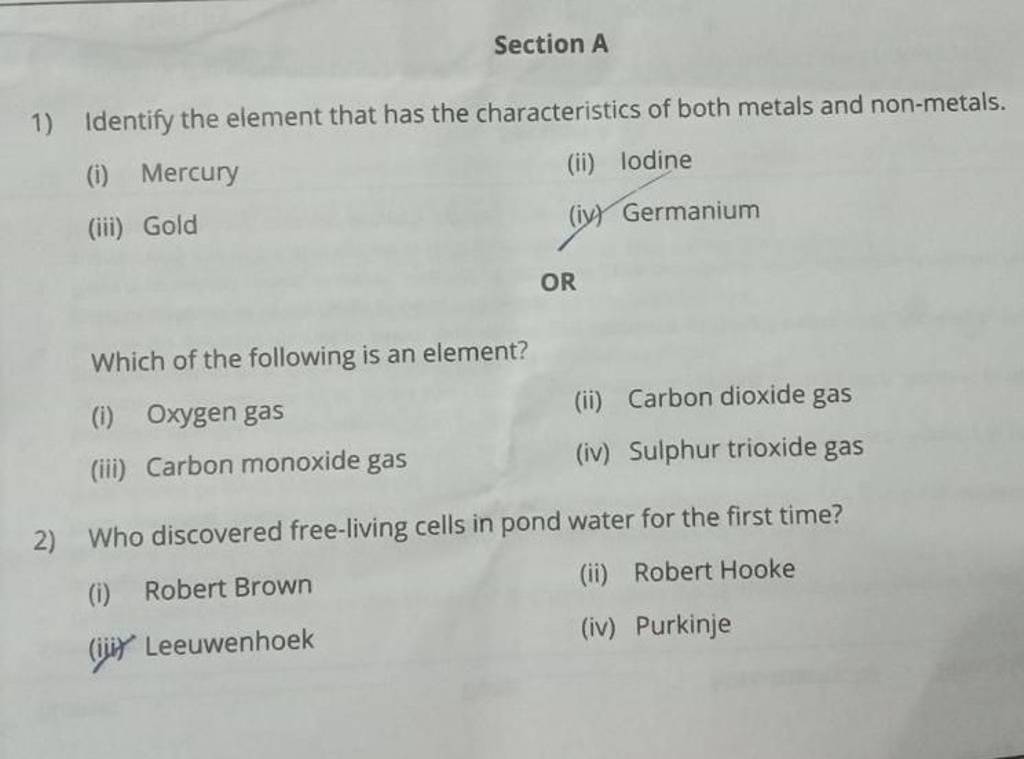Antonie van Leeuwenhoek discovered free living cells in pond water. In the 17th century, Antonie van Leeuwenhoek, a Dutch scientist and microscopist, made groundbreaking observations by examining samples of pond water under a simple microscope.
Using his own handcrafted microscope lenses, Van Leeuwenhoek became the first person to observe and describe free living cells, including bacteria and Protozoa, in the water. His discoveries were instrumental in the development of microbiology and our understanding of the microbial world.
Van Leeuwenhoek’s observations laid the foundation for future discoveries in the field of biology and paved the way for the understanding of the microscopic world that exists around us.

Credit: slideplayer.com
Antonie Van Leeuwenhoek
Antonie van Leeuwenhoek made a groundbreaking discovery of free-living cells in pond water. His meticulous observations unveiled a microscopic world teeming with life, revolutionizing our understanding of biology. Through his pioneering work, van Leeuwenhoek laid the foundation for modern microbiology.
Antonie van Leeuwenhoek was a Dutch tradesman and scientist who is credited as the first person to discover free-living cells in pond water. Born on October 24, 1632, in Delft, Netherlands, Leeuwenhoek’s groundbreaking observations were made possible through his advancements in lens grinding, ultimately leading to the creation of a single-lens microscope.The First Glimpse Through A Microscope
In the 1670s, Leeuwenhoek invented a powerful microscope that allowed for the observation of previously unseen microorganisms. By grinding lenses to provide up to 270x magnification, he was able to explore the microscopic world and gain unparalleled insight into the existence of microorganisms in samples of pond water.Pioneering Observations
Through his microscope, Leeuwenhoek made pioneering observations, reporting the existence of single-celled organisms in water and dental plaque. His detailed and accurate descriptions of microorganisms, which he called “animalcules,” provided the first evidence of the existence of bacteria and protozoa, laying the foundation for the field of microbiology. Leeuwenhoek’s meticulous studies and precise observations revolutionized our understanding of the natural world, and his contributions continue to inspire scientific discovery to this day.
Credit: slideplayer.com
Robert Hooke
In the world of biology, Robert Hooke is celebrated for his groundbreaking contributions.
The Revolutionary Microscopic Work
Robert Hooke’s noteworthy discoveries revolutionized the field of microscopy.
- Used microscope to observe samples
- Examined various substances
- Contributed to cell theory
Discovery Of ‘cells’
Robert Hooke’s examinations of cork led to the first description of cells.
- Coined the term “cells”
- Observed cell structure
- Published findings in 1665
Ferdinand Cohn
Ferdinand Cohn, a renowned German botanist and microbiologist, played a significant role in our understanding of the microbial world. His immense contributions to bacteriology and microscopy have shaped the field of microbiology as we know it today.
Contributions To Bacteriology And Microscopy
Through his extensive research and observations, Ferdinand Cohn made groundbreaking contributions to the field of bacteriology. He developed crucial techniques and methodologies for the study of bacteria and laid the foundation for further advancements.
Cohn’s expertise in microscopy allowed him to observe and document the intricacies of microorganisms. His detailed studies revealed the presence of cell structures and helped identify different types of bacteria. These contributions revolutionized our understanding of the microbial world.
Key Discoveries In Microbial World
One of Ferdinand Cohn’s most significant discoveries was the identification of free-living cells in pond water. Through meticulous observations, he unveiled the presence of microorganisms that can live independently without relying on a host organism.
This groundbreaking discovery challenged the prevailing belief that all microorganisms are obligate parasites. Cohn’s findings opened up new avenues of research, expanding our knowledge of the diverse microbial life forms that exist in nature.
Moreover, Cohn’s research shed light on the importance of microorganisms in various ecological processes and their impact on the environment. His discoveries became crucial building blocks for future scientists to delve deeper into the world of microbiology.
Pond Water Microbiology
The study of pond water microbiology explores the diverse and complex world of microorganisms that inhabit pond ecosystems. These microorganisms play a crucial role in maintaining the balance and health of pond water, and their discovery has had a profound impact on modern microbiology.
Role Of Free Living Cells In Pond Ecosystem
Free living cells, which were first discovered in pond water, play a vital role in maintaining the delicate balance of pond ecosystems. These microorganisms are essential for breaking down organic matter, recycling nutrients, and contributing to the overall health and biodiversity of the pond environment. Additionally, free living cells serve as a food source for other organisms, creating a complex web of interdependencies within the pond ecosystem.
Influence On Modern Microbiology
The discovery of free living cells in pond water has had a profound influence on modern microbiology. It has provided scientists with valuable insights into the diversity and ecological significance of microorganisms in natural environments. Furthermore, the study of these microorganisms has contributed to advancements in fields such as biotechnology, environmental science, and bioengineering, opening up new avenues for research and innovation.
Modern Microscopy Techniques
Advancements in modern microscopy techniques have revolutionized the way scientists study and understand the world around us. The ability to observe the intricate details of free-living cells in pond water has been made possible through the use of state-of-the-art microscopic tools and technologies. These advanced tools have significantly impacted scientific discoveries, opening doors to new realms of knowledge and understanding.
Advanced Tools For Microbial Studies
Scientists now have access to a wide array of cutting-edge tools that have transformed the study of free-living cells in pond water. These tools include electron microscopes, confocal microscopes, and super-resolution microscopes. Electron microscopes enable researchers to visualize microorganisms at an unprecedented level of detail, while confocal microscopes allow for the three-dimensional imaging of cells, providing insights into their structures and behaviors. Furthermore, super-resolution microscopes have pushed the boundaries of what is observable at the cellular level, allowing scientists to delve even deeper into the world of microbial studies.
Impact On Scientific Discoveries
The advent of modern microscopy techniques has had a profound impact on scientific discoveries, particularly in the field of microbiology. By harnessing the power of these advanced tools, researchers have been able to uncover previously unknown complexities within free-living cells in pond water. This has led to breakthroughs in our understanding of cellular processes, biological interactions, and environmental dynamics. The insights gained from these discoveries have not only expanded our knowledge of the microbial world but have also paved the way for new avenues of research and innovation.

Credit: www.meritnation.com
Conclusion
Finally, the discovery of free-living cells in pond water revolutionized biology. This breakthrough paved the way for significant advancements in scientific research and our understanding of the microscopic world. As we continue to explore the wonders of nature, the significance of this finding remains as vital as ever.




